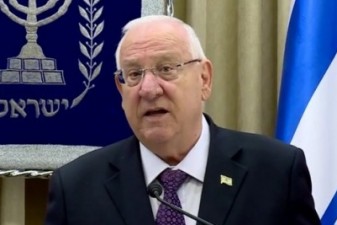
25/04/2015 14:58
Israel’s President Endorses Pope’s Comments on Armenian Genocide
Israeli President Reuven Rivlin spoke out strongly on the question of the Armenian genocide in a closed session with journalists held last week in Jerusalem in honor of Israel Independence Day. The comments, made in response to a question posed by The Tower and cleared for publication today, will do little to ease relations between Israel and Turkey—which strongly condemns any efforts to use the term “genocide”—and will also form a sharp contrast with the refusal of U.S. President Barack Obama to use the word “genocide” in discussing the tragedy of the Armenians in 1915, despite having promised to do so when he ran for president in 2008.
April 24 will mark the internationally recognized 100th anniversary of the systematic extermination of over one million Armenians and their expulsion from their traditional homeland in Turkey in 1915. Ninety percent of Turkish Armenians, it is estimated, lost their lives.
In his comments, Rivlin drew a direct historical link between the world’s failure to prevent the Armenian genocide and the Holocaust. “The Nazis,” he said, “used the Armenian genocide as something that gave them permission to bring the Holocaust into reality.”
Rivlin also endorsed the comments made by Pope Francis on April 12, in which he referred to the slaughter of the Armenians as the “first genocide of the Twentieth Century.” The comments triggered condemnations from the Turkish government, which also recalled its ambassador to the Vatican. “I will congratulate the Pope on these comments,” Rivlin said. “This is important to Christians, Jews, Muslims—to human beings.”
Although not the same as official national recognition or government policy, comments by Israel’s president express a powerful sentiment shared by a great many Israelis, whose country was founded in the shadow of the Holocaust, and whose early Zionist history includes no small number of references to the Armenian genocide as a harbinger of what might await Jews if they did not leave Europe.
For several years, the question of Rivlin’s position has been an increasingly sensitive one as he moved from his previous position as Speaker of the Knesset to his current role as President. Once an outspoken proponent of official recognition of the Armenian genocide, this past December, Rivlin raised some eyebrows when he refused to sign the annual letter calling on Israel to formally recognize the slaughter.
In a speech before the United Nations commemorating the Holocaust the following month, however, Rivlin implicitly recognized the Armenian genocide and drew a direct connection between the world’s failure to act in 1915, again during the Holocaust, and then again in subsequent genocides around the world. Rivlin also recounted how his family, which lived in Jerusalem at the time, saw the Armenian refugees streaming into the Holy Land in the wake of the genocide. “In the Land of Israel of the time, in which I was born, no one denied the murder that occurred. The residents of Jerusalem, my parents, saw them coming by thousands, starving, burning sticks snatched from the fire. In Jerusalem they found refuge and their descendants live there to this day.”








